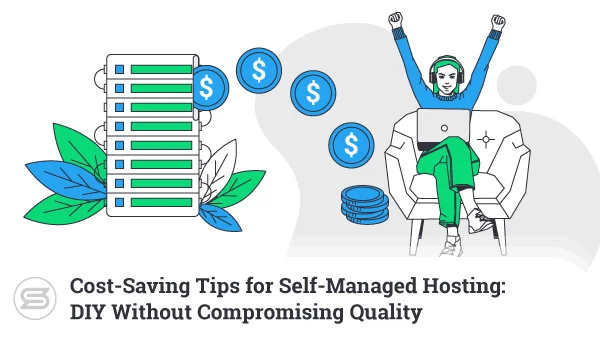What Type of Websites Should be Hosted on VPS?
Virtual Private Server (VPS) hosting is one of the most interesting types of web hosting plans. The characteristics of VPS makes it suitable for a large range of use. It lies in the middle ground between shared hosting and dedicated servers, sharing similar traits to Cloud hosting accounts.
VPS hosting is known for:
- Isolated account environments
- Good scalability of resources
- Guaranteed resource availability
- Wide choice of Operating System types
- Increased security
- Superior performance
- Root access
While technically VPS hosting can be used for almost all purposes, as with everything there are caveats to this. For example, it’s superior security makes it better than shared hosting for commercial websites like online stores. However, the technical skills required to handle VPS may make it a bigger headache than necessary for simple sites.
Let’s consider some of the use cases we might encounter for VPS along with its suitability for each;
VPS Hosting and Small Websites
In the context of this article, we’re taking small websites to indicate those with more limited content, simple needs, and lower levels of web traffic. Because most of these sites are often operated by single owners, VPN may add unnecessary dimensions of complexity.
VPS plans come in two flavors – managed and unmanaged. Whereas managed VPS takes away some of the complexity in handling, they are often significantly more expensive than unmanaged VPS plans.
Unmanaged VPS plans will require small website owners to be familiar with at least basic levels of server and networking management. This may pose a challenge for some that isn’t necessary.
VPS Hosting and Online Stores
VPS plans are very well suited for use to host online stores. eCommerce websites require strong performance, superior reliability, and most of all, high security. These are some of the core benefits that VPS plans offer.
In fact, online stores should look towards Cloud-based VPS plans such as the ones ScalaHosting offers. Cloud VPS gives users the added advantage of much greater scalability potential as well as more reliability over traditional VPS.
Although it is possible to start off on shared hosting and then move to VPS, this isn’t really recommended for online stores. Having to migrate once your site is running can incur significant cost and possibly downtime. When weighed against the small increase in cost factor from shared hosting to entry level VPS plans, it doesn’t really make sense to consider shared hosting in this scenario.
Paying customers are often more sensitive to changes in their buying environments. It is better to deploy immediately on VPS and scale up gently as your traffic increases.
VPS Hosting and Web Apps
Web applications are a bit more complex because they’re different from most types of standard websites. In general, web applications tend to require specialized environments and consume a greater amount of resources than websites.
Because of how highly configurable VPS hosting is, web applications developers have very little fear that the tools they need might be unsupported by the plan. If you’ve set up something that might not be right for your needs, you can simply tear down the entire environment and deploy it from scratch.
The extremely granular control gives you micromanagement capability over everything in your VPS environment. Web applications could require a much greater degree of resource scalability and the VPS instant resource provisioning can provide exactly that.
VPS Hosting and SaaS
In a similar way to web applications, VPS accounts are highly suited for Software-as-a-Service (SaaS) deployments. SaaS is the provision of web-based services to users and has become increasingly popular.
SaaS deployments often need to serve many users in order to be profitable. This requires both a high amount of resources as well as guaranteed availability of them. Even if you find shared hosting that provides a generous amount of resources, a single rogue account on the server could bog resources down.
The isolated environment of VPS guarantees resources for anytime use as well as offers greater security for users. The customization possibility also makes it ideal to run anything your SaaS might need to operate.
VPS Hosting and Corporate Websites
In a similar way to how we assess small websites, corporate websites are taken in this context to require slightly better capacity for traffic volume. More importantly, they need to be used on plans that are much more reliable than what shared hosting can offer. VPS hosting typically has better uptime guarantees in Service Level Agreements.
Corporate websites, even if they only offer simple static content, are digital brand representations. This means that they can be considered as part of the company’s image. Due to this, any downtime or other irregularities on corporate sites can cause significant brand damage.
The reliability offered by VPS plans are an important factor in mitigating this risk. COmpared to the potential impact of brand damage, the slightly higher cost of VPS plans are hardly of any significance.
VPS Hosting and News Websites
The term ‘news website’ can be interpreted in various ways. However, in order to be successful, news websites need to be updated continuously and be able to handle significant amounts of web traffic even if it’s simply to monetize through advertising.
Both of these areas are part and parcel of what VPS plans are capable of. In many cases, shared hosting plans are quite limited in the volume of traffic they can handle. They are also not easily scalable past a certain point.
Modern news sites also have to take into account the evolving need to handle content of different types. Multimedia content like video and audio clips will require more resources to handle efficiently.
Thanks to the evolution of web applications such as Content Management Systems (CMS), more news websites are beginning to emerge on these platforms. While CMS may make things easier for site owners, they also put increased strain on web hosting resources.
As sites like these grow in complexity and volume, it is also certain that a migration to VPS hosting may be inevitable in the near future.
VPS Hosting and Educational Websites
On the surface, most educational websites offer basic materials that cover the institute and what it does. However, you may not realize that many also serve as a portal towards a much deeper backend.
The hidden portion of educational sites is often where current students and academic staff can login to access restricted data and systems. This may include anything from digital learning materials to student loan processing systems.
It is this area which requires greater security and resources that won’t typically be found on shared hosting plans. Because of this, educational websites are normally hosted on more advanced plans such as VPS hosting.
Most education institutes will also have dedicated IT teams capable of handling VPS environments with ease. Smaller ones can opt for managed VPS plans instead.
VPS Hosting and Community & Wiki Websites
Community and Wiki sites are a bit more difficult to consider and it almost always boils down to traffic volume. Smaller wiki and community sites can be run on shared hosting since they too offer a great range of options in deployable web applications today.
However, due to the security element that may come into play, VPS hosting should be considered instead. For example, these sites may have to handle and store extraordinary amounts of user data. The added security that VPS offers might make it a safer option.
Conclusion
As you can probably tell by now, VPS hosting is a very flexible option. Depending on the use cases discussed in this article, you can roughly divide it into two key categories. In some deployments such as online stores, VPS plans are important and should be used as far as possible.
For others like Wiki and community sites, it may offer better security features which are good to have. However in these scenarios, VPS isn’t always necessary and users can opt for shared hosting instead.
At the end of the day, it is important to realize that VPS plans are better for those who require their deployments to be more stable, offer better performance, and increased security profiles.


Frequently Asked Questions
What is VPS hosting used for?
VPS hosting offers guaranteed dedicated resources, more secure environments that are highly configurable, and increased reliability. It can be used to host almost any kind of website. As a general guideline, commercial sites or those with more web traffic should look towards VPS hosting.
Can I host multiple websites on VPS?
You can not only host multiple sites with VPS accounts but even host each of them within their own environment, should you wish. This high degree of flexibility is one of the advantages that VPS accounts have to offer.
Do I need VPS hosting?
Everything else aside, once you reach a point that hits the limits of shared hosting, VPS is your next logical step up. Shared hosting typically offers limited scalability in resources and when you hit those limits, you won’t have many other options.
Which type of hosting is best for eCommerce websites?
eCommerce websites need the high performance and security offered by VPS accounts. It is possible to run them on shared hosting, but not recommended at all. Remember that eCommerce sites typically process user data and financial information, so added security is a must.
How do I choose a VPS host?
There are many things to consider when looking for a suitable VPS hosting provider. Consider your needs as well and then match them with what’s on offer. Where possible assess the performance of their web servers and get in touch with their customer service to gauge levels of support available. You might also wish to see what value added services the host may provide such as customized technologies to improve performance.
What is a VPS – Everything you need to know!



